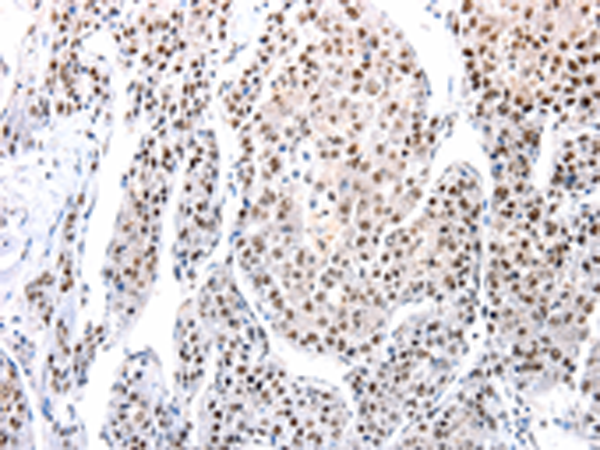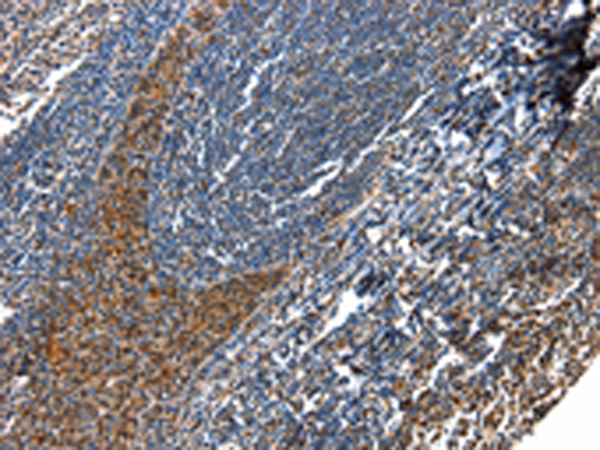

| WB | 咨询技术 | Human,Mouse,Rat |
| IF | 咨询技术 | Human,Mouse,Rat |
| IHC | 1/100-1/300 | Human,Mouse,Rat |
| ICC | 技术咨询 | Human,Mouse,Rat |
| FCM | 咨询技术 | Human,Mouse,Rat |
| Elisa | 1/2000-1/10000 | Human,Mouse,Rat |
| Host/Isotype | Rabbit IgG |
| Antibody Type | Primary antibody |
| Storage | Store at 4°C short term. Aliquot and store at -20°C long term. Avoid freeze/thaw cycles. |
| Species Reactivity | Human, Mouse, Rat |
| Immunogen | Synthetic peptide of human AQP2 |
| Formulation | Purified antibody in PBS with 0.05% sodium azide and 50% glycerol. |
+ +
以下是关于AQP2抗体的3篇参考文献示例(文献信息为模拟示例,仅供参考):
---
1. **文献名称**:*Aquaporin-2: A key regulator of water balance in the kidney*
**作者**:Nielsen S, et al.
**摘要**:该研究首次通过AQP2特异性抗体定位了其在肾脏集合管主细胞中的表达,揭示了其在抗利尿激素(AVP)调控下的膜转运机制,为尿崩症的病理机制提供了关键依据。
---
2. **文献名称**:*Antibody-based detection of AQP2 phosphorylation in vasopressin signaling*
**作者**:Fushimi K, et al.
**摘要**:作者利用针对AQP2不同磷酸化位点的特异性抗体,揭示了AVP通过cAMP-PKA通路调控AQP2的磷酸化及细胞内转运过程,阐明了尿液浓缩的分子机制。
---
3. **文献名称**:*AQP2 antibody validation in lithium-induced nephrogenic diabetes insipidus models*
**作者**:Wesche D, et al.
**摘要**:研究通过免疫组化和Western blot验证了AQP2抗体的特异性,并发现锂处理导致肾脏AQP2蛋白表达显著下调,提示其在获得性尿崩症中的潜在作用。
---
4. **文献名称**:*Loss of AQP2 expression in hypokalemia: Evidence from knockout mice and antibody-based assays*
**作者**:Kwon TH, et al.
**摘要**:通过AQP2抗体检测低钾血症小鼠模型,发现AQP2膜定位减少且总蛋白表达下降,表明电解质紊乱可直接影响肾脏水通道蛋白功能。
---
(注:以上文献为示例,实际引用需根据具体研究补充准确信息。)
Aquaporin-2 (AQP2) is a water channel protein primarily expressed in the kidney’s collecting duct principal cells, where it regulates water reabsorption and urine concentration. It is a critical component of the vasopressin-regulated water homeostasis system. AQP2 antibodies are immunological tools designed to detect and study the expression, localization, and function of AQP2 in both physiological and pathological contexts. These antibodies are widely used in research to investigate conditions like nephrogenic diabetes insipidus (NDI), a disorder linked to AQP2 dysfunction due to genetic mutations or acquired factors (e.g., lithium toxicity).
Polyclonal and monoclonal AQP2 antibodies are generated using immunogenic peptides or recombinant proteins, enabling applications such as Western blotting, immunohistochemistry, and immunofluorescence. Studies utilizing these antibodies have revealed AQP2's dynamic trafficking to the apical membrane upon vasopressin stimulation, a process disrupted in certain kidney diseases. Additionally, AQP2 antibodies aid in diagnosing renal disorders by assessing protein expression in patient biopsies or animal models. Recent research also explores AQP2's role beyond water transport, including potential involvement in cell proliferation and cancer. However, antibody specificity remains a concern, necessitating rigorous validation via knockout controls or siRNA-based approaches. Overall, AQP2 antibodies are indispensable for unraveling molecular mechanisms of water balance disorders and developing targeted therapies.
×